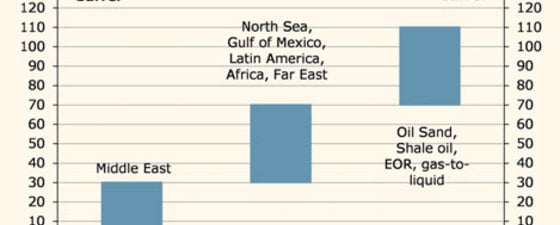During the financial crisis the Brent oil price fell by 75% to US $36.6/barrel in December 2008, from US $146/barrel in July. If we assume that the recent increase in uncertainty and the weaker economic performance of the US and the Euro zone will push the world economy into a prolonged period of low economic growth, do we expect a new collapse in the oil price?
Assuming that global GDP growth will be 0.5% lower in 2011 and 2% lower in 2012 than in our baseline scenario, oil demand is expected to be reduced by 400,000 bpd in 2011 and 1.4 MMbpd in 2012. A new economic downturn will clearly trigger a sharp fall in oil demand, but in our opinion a few recent developments in the oil market may have a counterbalancing effect on the fundamental situation, thereby preventing oil prices from falling to the lows seen in 2008.
First, OPEC has not changed its official output quota since January 2009 when the cartel agreed to cut 4.2 MMbpd. The cartel does not need to coordinate new production quotas before it can start reducing its output if demand conditions deteriorate to a level where the market becomes oversupplied. Second, we expect OPEC to cut oil production at an earlier stage of a new recession cycle. Huge spending packages to try to prevent further uprising in the MENA region have in our opinion pushed up OPEC’s breakeven price of oil – the price at which its budget is balanced while accommodating greater public spending.
In 2009 OPEC’s unofficial oil price target was US $70-90/barrel, but we now expect this unofficial price range to have moved to around US $85-105/barrel. Saudi Arabia, the cartel’s ultimate leader, needs an oil price of around US $85/barrel to balance its budgets. Third, the refilling of the emergency inventories after the IEA stock release will contribute to tightening the market. In addition, as prices drop we would not be surprised if China uses this opportunity to fill up its strategic petroleum reserves (SPRs).

